Numeracy development Addition & Subtraction Worksheets for 3-Year-Olds
3 filtered results
-
From - To
Enhance your toddler's numeracy skills with our dynamic Addition & Subtraction Worksheets, specifically designed for 3-year-olds. Our colorful, interactive worksheets make learning fun, fostering early math skills through engaging exercises. These printables help young learners grasp the basics of addition and subtraction, laying a strong foundation for future mathematical success. With easy-to-follow instructions, your child can embark on a joyful journey of number discovery. From simple counting to first equations, our worksheets cater to curious minds and encourage a love for learning. Explore a world of numbers with Kids Academy and watch your child thrive!


Adding Flower Petals Worksheet
Numeracy development, particularly in the realms of addition and subtraction, is crucial for 3-year-olds as it lays the foundation for essential cognitive and practical skills. At this early age, toddlers are highly receptive to learning experiences, and engaging them in basic numerical activities can significantly boost their cognitive abilities. Understanding addition and subtraction fosters critical thinking, problem-solving skills, and logical reasoning, which are vital for overall brain development.
For parents and teachers, fostering these skills ensures that children develop a positive attitude towards mathematics and learning in general. Early numeracy skills translate into confidence in handling more complex mathematical concepts as they grow. Furthermore, addition and subtraction exercises can enhance fine motor skills and the ability to recognize patterns and sequences.
Activities like counting toys, using fingers to add and subtract, and incorporating numerical language in daily routines can make learning natural and enjoyable. Such pragmatic approaches not only build numeracy skills but also strengthen a child’s ability to communicate and understand their environment.
Thus, prioritizing numeracy development at a tender age equips children with foundational tools that benefit their academic journey and everyday life, fostering holistic development and future success in diverse areas.
 Assign to My Students
Assign to My Students






















